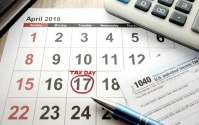So, Wall Street’s “fear gauge” just had a meltdown. The VIX index, the thing they trot out whenever the market gets the shakes, spiked over 30%. The headlines are screaming about a "100% surge," "skyrocketing uncertainty," and "geopolitical tensions." You can almost hear the air-raid sirens wailing from the news desk. Your portfolio, if you're one of the little guys who still has one, probably looked like a crime scene. Red everywhere.
And yet, if you listen closely, you can hear another sound. It’s the calm, almost bored voice of the financial elite telling you to relax. It’s just a little turbulence, folks. Nothing to see here. Move along.
This is the part that drives me crazy. The disconnect is so profound it feels like a glitch in the Matrix. On one hand, you have the data: the S&P 500 and Nasdaq taking their worst single-day beating since April. The VIX index jumping from a sleepy 16 to over 21 for the first time in months. For 100 straight days, the market was flatlining, a placid lake of corporate complacency. Then, one headline about tariffs or inflation hits—like the news that the VIX Spikes Above 20 After Trump's Tariff Threats—and wham—the monster under the bed is real.
But then the experts get wheeled out to calm the herd. And what they say is… just astonishing.
The "Everything Is Fine" Brigade
Let’s deconstruct the official narrative, shall we? Mandy Xu from CME Group says a VIX price of 21 "is not a cause for concern." She calls it a normal "repricing driven by news." It's the same sentiment you see in headlines proclaiming that while US Stocks Suffer Heavy Losses! VIX Index Surges but Market Sell-off Remains Rational. Translation: "You peasants are overreacting again. Go back to your cubicles."
Give me a break. A 30%+ jump in the market's primary fear metric in a single day isn't a cause for concern? It’s like watching your house catch fire and the fire chief shows up, takes a drag from his cigarette, and says, "Eh, we've seen worse. The foundation is still solid." Of course it's not a concern for you, Mandy. You probably have a strategy to profit from this.

Then there’s Alex Kosoglyadov from Nomura. He claims they "did not see clients rushing to buy protective positions." He says dealer positioning is "very clean" and "more balanced" than during previous sell-offs. This is the most revealing line of all. It’s corporate-speak for, "The big banks were ready for this. We aren't exposed, so the system is safe." What about the regular folks invested in a SPY or QQQ index fund? Well, that's not really their problem is it.
The whole thing feels like a carefully managed demolition. The insiders see the charges being set, they stand a safe distance away, and then they tell the people living inside the building not to worry about the loud noises. But if the market is so "orderly" and dealers are so "balanced," why did it drop like a stone in the first place? And who are these mythical "dip buyers" who always, always have billions in cash sitting on the sidelines, just waiting to prop the market back up the second it stumbles? It ain't your uncle Dave, I can tell you that.
A Minor Ripple, or a Warning Shot?
The talking heads love to throw out historical comparisons to make today’s panic look trivial. They point out that during the 2008 financial crisis, the stock VIX went past 89. During the COVID crash, it hit 85. So, this little jaunt to 21? That’s nothing. A "minor ripple," as one strategist put it.
This is a fundamentally dishonest argument. It’s like telling someone who just got hit by a car that they should be grateful they weren't hit by a freight train. The pain is still real. The damage to a 401(k) is still real. Comparing every market dip to a once-in-a-generation catastrophe is a tactic designed to make you feel stupid for being worried. It’s financial gaslighting.
What's worse is the sheer glee some of these guys have. Vuk Vukovic of Oraclum Capital said this drop is "more of an opportunity for volatility sellers to step in." This is a bad take. No, "bad" doesn't cover it—this is a five-alarm dumpster fire of an opinion. He’s openly admitting that your fear is their payday. They aren't trying to calm the market; they’re waiting to sell insurance policies while the city burns. The VIX futures market is just a casino where they bet on how scared you're going to be tomorrow.
And honestly, what choice do we have? We're forced to play their game. We have to invest for retirement, to save for our kids, to try and build some kind of future in an economy that feels increasingly rigged. We put our money in, cross our fingers, and hope the people running the show aren't actively betting against us. But then you see a day like this, and you realize...
Just Another Day at the Casino
Let's be real. The VIX isn't a "fear gauge." Not for us, anyway. It's an opportunity gauge for them. It measures the turbulence they can exploit. When it's low, they get bored. When it spikes, their eyes light up. They call it "repricing" and "orderly sell-offs," but for millions of people, it's just the sickening feeling of watching their future shrink in real-time. They tell us not to panic, but their entire business model is built on creating and then profiting from that very panic. So next time you see the VIX today chart screaming upwards, don't ask if you should be scared. Ask who's getting rich from it. The answer is never you.









